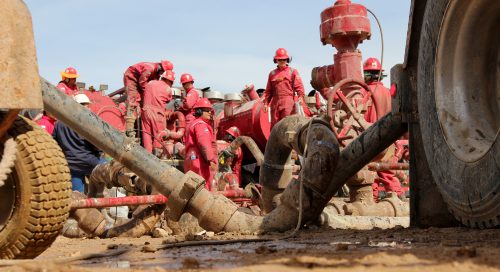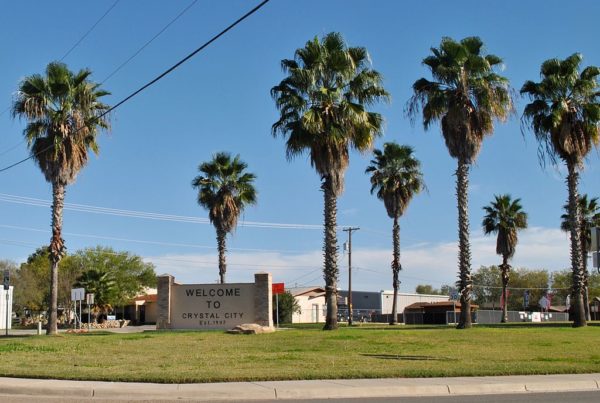Water in west Texas is both an environmental issue and a major stress on overhead for oil and natural gas producers in the Permian Basin. A private- public partnership in Midland is trying to address both concerns at the same time.
Hydraulic fracturing (known colloquially as fracking) is unlocking once inaccessible oil and gas in the country’s highest producing oil field. Perfected in Texas, fracking has changed the global dynamics of oil and gas. Right now, U.S. oil production trails only Saudi Arabia but not by much. But a U.S. Geological Survey study finds that on average, oil and natural gas fracking uses more than 28 times the water it did 15 years ago. A well typically uses between two and eight million gallons of water which the study says puts farming and drinking sources at risk in arid places like Texas.
Fracking, now banned in New York state, injects industrial amounts of sand, water and chemicals into the ground – at high pressure – to release trapped oil and natural gas. The American Geological Union says fracking takes place in places where water may become scarcer in a warming world, including Texas, the Rocky Mountains and the Great Plains – regions hit by drought during parts of the last five years. When it comes to fracking and water use one mitigating tactic may lie within the wastewater treatment plant in Midland. It’s the site of a new partnership between Midland, and Irving-based Pioneer Natural Resources. The deal simultaneously addresses city finances, environmental responsibility and oil and gas production. Pioneer is paying to upgrade the plant which will ultimately save Midland 110 million dollars.
Midland Mayor Jerry Morales sums up the deal as a boon to the taxpayer.
“(It is) a savings for the citizens of Midland by not having to go after any debt or affect our budget,” he says. In return for paying for the upgrade at the water treatment plant in Midland, Pioneer gets to move some of that treated water to its oilfields saving hundreds of millions of gallons of fresh water.
“We made a commitment several years ago that we need to move away from fresh water,” explains Pioneer’s Executive Chairman, Scott Sheffield at Energy Week 2017, an annual gathering of energy experts hosted by the University of Texas at Austin’s Energy Institute, the Kay Bailey Hutchison Center for Energy, Law and Business and the student-run Longhorn Energy Club.
Sheffield says Pioneer isn’t just doing this to help the environment. It’s also about saving money on the cost and transport of water to the oil field. “We’re doing it at a price which is much less than what it costs to truck fresh water in,” he says. Sheffield said this all began several years ago.
“We put together a geologic team to look for formations below the fresh water sands. And we found several sources of water there. We went to the cities of Midland and Odessa. And we’ve worked out agreements with them to use rated wastewater,” he says.
So now the question is, can this be replicated? Energy consultant Kinnon Goleman in Austin says yes. He cited Concho Resources, another major player in the Permian Basin that has its own, similar deal with Odessa.
“Originally everyone thought we had to do it with freshwater. In the last 15 years we’ve learned that we don’t have to use nearly as clean a water, or fresh water,” Goleman says.
Goleman said this kind of private-public partnership is a good fit for cities such as Midland and Odessa given their rapid population growth. Upgrading a wastewater treatment plant is expensive and cumbersome. But it has to be done to meet government certifications. Meantime, oil and gas interests save on one of the biggest strains on their overhead.
“Lowering the cost of drilling and completing the well is very, very significant. And it’s been changing rapidly and part of it is the water equation,” Goleman says.
Michael Webber is deputy director of the University of Texas at Austin Energy Institute and the author of “Thirst for Power:Energy, Water, and Human Survival,” a work that considers how both resources; energy and water, can be sustained.
“I think this kind of deal will be replicated,” says Webber, though he explained not quite everywhere. He said the mix of heavy drilling and stress on water supplies found in the Permian Basin isn’t universal. He does think society will at some point abandon the notion that water is an inexhaustible resource. And that, he said, will spur innovation in the way water is deployed and paid for in energy production.
“When you have the situation with oil and gas companies that have a lot of money and need water and you you have big users like cities or agricultural operations that have a lot of water and need money, then his is the perfect opportunity for a trade. And because that water is worth so much money to oil and gas, it’s worth more money per barrel to oil and gas than it is to a farmer, because the oil and gas operation can take a barrel of water and produce a lot of money with it, they’re willing to invest that money. That’s the right set of ingredients for it,” he says.
Webber believes it will ultimately be the free market and not only environmental concerns that may change the way freshwater is deployed in energy production.














